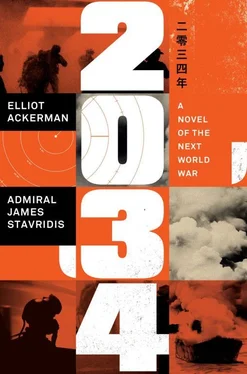Within the first few sentences, Chowdhury was lost. He had never been detail oriented, particularly when those details were technical in nature. This was why he’d found his way into politics after graduate school. This was also why Hendrickson—brilliant though he was—did, technically, work for Chowdhury. As a political appointee on the National Security Council staff Chowdhury outranked him, though this was a point few military officers in the White House would publicly concede to their civilian masters. Chowdhury’s genius, while not technical, was an intuitive understanding of how to make the best out of any bad situation. He’d gotten his political start working in the one-term Pence presidency. Who could say he wasn’t a survivor?
“The second situation is developing,” continued Hendrickson. “The John Paul Jones command group—a three-ship surface action group—has diverted the flagship from its freedom of navigation patrol nearby the Spratly Islands to investigate a vessel in duress.”
“What kind of vessel?” asked Chowdhury. He was leaning back in the leather executive chair at the head of the conference table, the same chair that the president sat in when she used the room. Chowdhury was munching the end of his energy bar in a particularly non-presidential fashion.
“We don’t know,” answered Hendrickson. “We’re waiting on an update from Seventh Fleet.”
Even though Chowdhury couldn’t follow the particulars of the F-35’s stealth disruption, he did know that having a two-billion-dollar Arleigh Burke guided missile destroyer playing rescue tugboat to a mystery ship in waters claimed by the Chinese had the potential to undermine his morning. And splitting up the surface action group didn’t seem like the best idea. “This doesn’t sound good, Bunt. Who is the on-scene commander?”
Hendrickson shot a glance back at Chowdhury, who recognized the slight provocation he was making by using the old nickname. The two junior staffers exchanged an apprehensive look. Hendrickson chose to ignore it. “I know the commodore,” he said. “Captain Sarah Hunt. She is extremely capable. Top of her class at everything.”
“So?” asked Chowdhury.
“So, we’d be prudent to cut her a little slack.”

15:28 March 12, 2034 (GMT+8)
South China Sea
Once the order to render aid was given, the crew of the John Paul Jones worked quickly. Two RHIBs launched off the fantail and pulled alongside the burning trawler. The stocky blond lieutenant junior grade had been placed in charge of this tiny flotilla of inflatable boats, while Hunt and Morris observed from the bridge, listening to the updates he sent over his handheld radio with all the baritone hysteria of plays being called at the line of scrimmage. Both senior officers forgave his novice lack of calm. He was putting out a fire with two pumps and two hoses in hostile waters.
Hostile but completely calm, rigid as a pane of glass as the drama of the fire and the trawler played out a couple of hundred yards off the bridge. Hunt found herself staring wistfully at the water, wondering again if perhaps this might be her last time seeing such a sea, or at least seeing it from the command of a naval vessel. After a moment’s thought, she told the officer of the deck to send a signal to her other two destroyers to break off the freedom of navigation patrol and divert on-scene. Better to have a bit more firepower in close.
The Levin and Hoon reversed course and increased speed, and in a few minutes they had taken up positions around the John Paul Jones , sailing in a protective orbit as the flagship continued a dead slow approach toward the trawler. Soon, the last of the flames had been extinguished and the young lieutenant junior grade gave a triumphant announcement over the radio, to which both Hunt and Morris volunteered some quick congratulations followed by instructions for him to board and assess the extent of the damages. An order that he followed. Or at least tried to follow.
The crew of the trawler met the first boarding party at the gunnels with angry, desperate shouts. One went so far as to swing a grapple at a boatswain’s head. Watching this struggle from the bridge of the John Paul Jones , Hunt wondered why the crew of a burning ship would so stridently resist help. Between radio transmissions, in which she encouraged a general de-escalation, she could overhear the trawler’s crew, who spoke in what sounded like Mandarin.
“Ma’am, I suggest we cut them loose,” Morris eventually offered. “They don’t seem to want any more help.”
“I can see that, Jane,” responded Hunt. “But the question is, why not?”
She could observe the boarding party and the crew of the trawler gesticulating wildly at one another. Why this resistance? Hunt saw Morris’s point—with each passing minute her command became increasingly vulnerable to intercept by a People’s Liberation Army naval patrol, which would undermine their mission. But wasn’t this their mission as well? To keep these waters safe and navigable? Ten, maybe even five years before, the threat level had been lower. Back then, most of the Cold War treaties had remained intact. Those old systems had eroded, however. And Sarah Hunt, gazing out at this trawler with its defiant crew, had an instinct that this small fishing vessel represented a threat.
“Commander Morris,” said Hunt gravely, “pull your ship alongside that trawler. If we can’t board her from the RHIBs we’ll board her from here.”
Morris immediately objected to the order, offering a predictable list of concerns: first, the time it would take would further expose them to a potential confrontation with a hostile naval patrol; second, placing the John Paul Jones alongside the trawler would put their own ship at undue risk. “We don’t know what’s on board,” cautioned Morris.
Hunt listened patiently. She could feel Morris’s crew going about their tasks on the bridge, trying to ignore these two senior-most officers as they had their disagreement. Then Hunt repeated the order. Morris complied.
As the John Paul Jones came astride the trawler, Hunt could now see its name, Wén Rui , and its home port, Quanzhou, a provincial-level anchorage astride the Taiwan Strait. Her crew shot grapples over the trawler’s gunnels, which allowed them to affix steel tow cables to its side. Lashed together, the two ships cut through the water in tandem like a motorcycle with an unruly sidecar. The danger of this maneuver was obvious to everyone on the bridge. They went about their tasks with a glum air of silent-sailor-disapproval, all thinking their commodore was risking the ship unnecessarily for a bunch of agitated Chinese fishermen. No one voiced their collective wish that their commodore let her hunch go by the boards and return them to safer waters.
Sensing the discontent, Hunt announced that she was heading belowdecks.
Heads snapped around.
“Where to, ma’am?” Morris said by way of protest, seemingly indignant that her commander would abandon her in such a precarious position.
“To the Wén Rui ,” answered Hunt. “I want to see her for myself.”
And this is what she did, surprising the master-at-arms, who handed her a holstered pistol, which she strapped on as she clamored over the side, ignoring the throbbing in her bad leg. When Hunt dropped onto the deck of the trawler, she found that the boarding party had already placed under arrest the half dozen crew members of the Wén Rui . They sat cross-legged amidships with an armed guard hovering behind them, their wrists bound at their backs in plastic flex-cuffs, their peaked fishing caps pulled low, and their clothes oily and stained. When Hunt stepped on deck, one of the arrested men, who was oddly clean-shaven and whose cap wasn’t pulled low but was worn proudly back on his head, stood. The gesture wasn’t defiant, actually quite the opposite; he was clear-eyed. Hunt immediately took him for the captain of the Wén Rui .
Читать дальше













